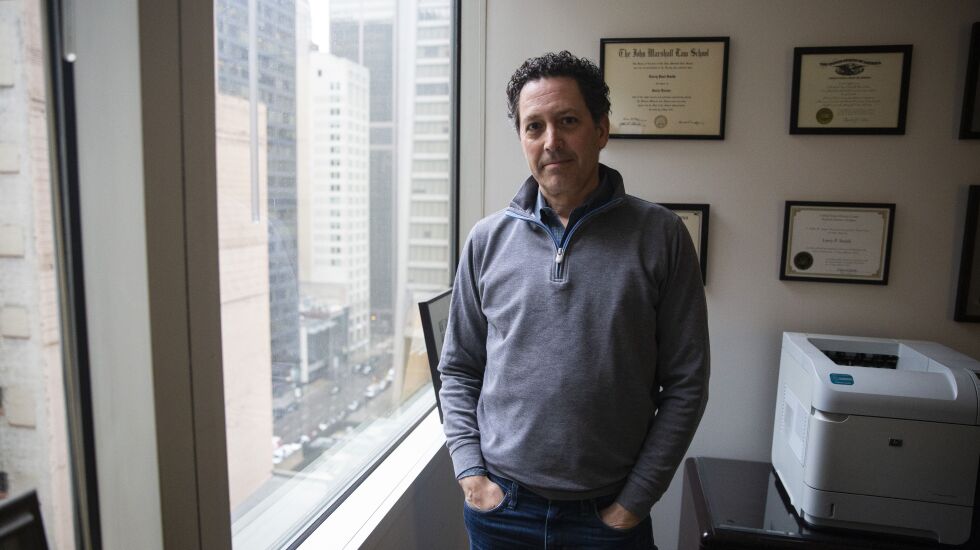
Running late and feeling stressed, Daniel Janicek was trying to make it to his small business in the West Loop, driving in from River Forest.
As he wheeled through a parking garage, his cellphone pinged. The call appeared to be from Chase Bank, where his hair salon business, Salon DJ, has an account. And the caller had an urgent question: Had Janicek just attempted several high-dollar transactions?
That encounter last January set off a whirlwind of transactions that left Janicek among thousands of consumers and businesses around Chicago and elsewhere who have been victimized by wire transfer fraud, a scam that collectively has cost them billions of dollars, experts say.
Consumer protections that kick in with other types of fraud don’t cover these scam wire transfers. It’s a problem that’s widely known in the banking industry, which sees its customers being victimized but says there’s little it can do to stop these rapid transactions once they’re in motion.
Beyond that, banks say, the swindles, though unfortunate, ultimately are the fault of the consumers themselves who are victimized.
Consumer advocates and lawyers take issue with that.
“You think your money is safe in a bank? It’s not,” says Chicago consumer rights attorney Larry Smith, whose firm has filed several lawsuits on behalf of victims.
Carla Sanchez-Adams, a senior attorney with the National Consumer Law Center, agrees.
“You think that your bank owes you a duty of care, but they don’t,” Sanchez-Adams says. “They have a fiduciary duty, but they don’t have a duty of care.”
Janicek says he was still on the phone as he walked out of the parking garage last winter when he “went into a state of almost panic” talking with the caller about the supposed transactions he knew he hadn’t made.
Janicek says the caller told him he was a Chase Bank fraud-prevention employee — which turned out not to be true — and promised he’d help him secure his business account, saying Chase would send him multiple verification codes to do that. Janicek received the codes and, as instructed by the man on the phone, read them back to him.
He was feeling better when the man said the next step was to protect Janicek’s personal Chase account. To do that, the caller told him to transfer $10,000 from his personal account to his business account, which had $9,000 in it. Janicek says he found that strange but thought: “Chase — they know what they’re doing.”
The last step, the fake bank employee said, was to move all of that to a “safety vault” where it would sit before going back into his account within the hour.
“I never thought I was wiring money,” Janicek says.
It wasn’t until later that night, when he was trying to fall asleep, that he began to rethink the call. That’s when a new wave of panic washed over him, and he realized he’d been scammed.

He says he called Chase around 11 p.m. to try to stop the transaction but was told the bank’s fraud department wouldn’t open for hours — not till 7 a.m.
“Pretty damn smart,” he says of the scam artist’s strategy. “It wasn’t pushy at all. It was just boring, slow.”
Loophole exploited
The Electronic Funds Transfer Act, EFTA for short, is meant to protect U.S. consumers from being defrauded when they make a transaction via an ATM, debit card or direct deposit or by point-of-sale and phone transactions. The federal law was passed in 1978, when cash machines were a new way to get money from your accounts.
The protections that the law offers mean, for instance, that if you lose a debit card but report the loss to your bank within two business days, the limit of your liability — how much money you can be out — is $50. If you report the loss between three and 59 days, your liability rises to $500.
The EFTA also allows consumers to sue banks for violations and collect triple financial damages plus attorney’s fees if they win.
But the law’s regulations make an exception for wire transfers. And scam artists have figured that out.
Wire transfer fraud has exploded since the start of the coronavirus pandemic, experts say. In a report to Congress last year, the FBI said its Internet Crime Complaint Center received reports on this kind of fraud totaling $2.4 billion in losses in 2021.
Complaints to the U.S. Consumer Financial Protection Bureau show the federal agency’s files are filled with heartbreaking stories from consumers, many of whom lost money in schemes involving large banks.
A spokesperson for the agency says the scams “have risen sharply, and financial fraud can be devastating for victims.”
The scams vary somewhat. But typically they start with a call, an email or a text that looks legitimate, like it’s from your bank. It will ask whether you authorized a transaction. Victims say the messages are so realistic they clicked through or stayed on the phone.
From there, a professional scammer typically posing as someone from the bank’s fraud department walks the victim through a series of steps.
As with Janicek, it all ends with an unwitting wire transfer.
In a particularly awful variation of wire transfer fraud, scammers have hacked into real estate agents’ emails and directed homebuyers to wire funds for a down payment or closing costs to an account that the scammer controls, stealing tens of thousands of dollars.
Once wired money hits the receiving bank, the scammers quickly transfer it elsewhere, often multiple times, to accounts across the United States and overseas, according to the FBI.
‘Breaking into the bank’

Shaylah Ware, who lives on the Southwest Side in Chicago Lawn, says she doesn’t know who wired $33,900 out of her Citibank account in March 2022 or how they did it. But she blames her bank for not flagging the out-of-the-ordinary transaction and stopping it.
Ware said it started with a text asking whether she’d attempted an “outgoing wire transfer” of $13,900 from her account. Surprised, she responded “no,” then logged into her Citibank account.
To her horror, $13,900 already had been withdrawn and wired elsewhere.
According to a federal lawsuit she has filed against Citibank, Ware immediately reported the error to the bank, then went there to file an affidavit.
While at the bank, Ware says she discovered more strange activity: $31,000 had been transferred from her savings to her checking account, then $20,000 had been wired out.
Altogether, $33,900 was gone.
The daycare teacher and mother of four previously had been victimized by a debit card theft and a forged check scam. Citibank refunded her money then, and Ware assumed the problem was fixed.
But when the new suspicious activity occurred, the bank told her she was out of luck.
“I thought it would be safe there versus leaving it at home,” she says of her money. “Wrong decision.”
Smith, who is representing her in the lawsuit, says bank executives know this is a problem but have ineffective systems that don’t stop the fraudsters.
“They’re not breaking into Shaylah’s computer,” Smith says of the scammers. “They’re breaking into the bank.”

The case is now in arbitration.
“I just want them to do the right thing and give me my money back,” Ware says.
‘It’s maddening’
A retired city worker named Thomas, speaking on the condition his last name isn’t published, says he feels the same way.
He got an email in June that appeared to have come from Chase. It said he’d signed up for a “platinum” credit card with a $499 annual fee. He hadn’t, so he called the customer service number listed in the email.
As he spoke with a supposed Chase rep, Thomas says, he logged on to his Chase account, and the fake bank employee somehow gained remote access to his computer.
He says the man told him he would restore $499 for the unwanted credit card but then said he’d accidentally put $20,000 in Thomas’s account — a huge deposit Thomas saw online in real time.
Thomas says the panicked-sounding fraudster told him that, to fix the error, he needed to remove the overpayment.
Thomas says the whole thing took hours, during which the young man, who said he had a wife and kids, repeatedly apologized and begged for help correcting it so he wouldn’t get fired.
When it was over, the mistaken $20,000 deposit was gone — but so was $19,450 of Thomas’s money.
He realized something was wrong and rushed down to the nearest Chase branch.
“I said, ‘This sounds like trouble. Let’s stop it right in its tracks,’ ” says Thomas, who stayed at the branch until closing.
But bank employees there said they couldn’t stop the wire transfer — nor could employees at the bank’s downtown headquarters the next morning.
“It’s maddening,” Thomas says.
He filed reports with the FBI, the Chicago Police Department and the Consumer Financial Protection Bureau.
He wonders why the bank’s algorithms — the ones that spot money-laundering and other crimes — aren’t able to flag and stop wire transfer fraud.
Not our fault, banks say
The banks say they do a lot to try to stop scams but that it’s not their fault when unwitting victims give a con artist an authentication code — essentially a key to their bank accounts.
The Consumer Bankers Association distinguishes between frauds done by hackers who steal someone’s account information and confidence scams that lure victims into wiring money.
The group says it’s not legal for banks to hold onto a customer’s money after the person has authorized a transfer.
In its response to Thomas’s complaint to the Consumer Financial Protection Bureau, Chase said it wouldn’t refund any of the retired city of Chicago worker’s money because he “compromised” his account “by providing sensitive account information to a third party.”
The bank said it tried six times to recall the wire transfer.
Representatives of Chase and Citibank say they won’t discuss individual cases.
A Citibank rep won’t talk at all about wire transfer scams.
A written statement from Chase calls the scams “heartbreaking” and says: “We urge all consumers to protect their accounts by never sharing personal information with someone they don’t know. Banks will never call, text or email asking customers to send money to themselves or anyone else to prevent fraud, but scammers will.”
American Bankers Association spokeswoman Sarah Grano says the industry “has ramped up anti-fraud efforts” and strengthened “behind-the-scenes security controls.”
Nessa Feddis, a senior vice president of the American Bankers Association, said in an online panel discussion last December that banks lost money if they made good on their customers’ losses to such fraud and faced damaged reputations if they didn’t.
“We’re all victims — the financial institutions as well as the consumers,” Feddis said.
Consumer advocates say that if banks can’t stop the scams, government regulators should step in.
“It’s a huge problem,” Chicago attorney Stephanie Tatar says. “If your systems are so sophisticated, why is this happening so many times?”
Searching for a fix
Finding a solution will mean first agreeing on what happened.
Banks typically argue that wire transfers were “authorized” transactions — even if the bank customer was tricked into giving that authorization.
But Sanchez-Adams of the National Consumer Law Center and other consumer advocates say a scam transaction cannot be authorized if the victim was fraudulently induced into making it.
Victims and consumer advocates want to close the wire transfer loophole in the Electronic Funds Transfer Act to provide more protection.
The banking industry opposes that, saying it would invite more fraud because criminals would then recruit customer-accomplices to file fake disputes.
Even without protection under the EFTA, consumers can sue banks for negligence under the federal Uniform Commercial Code or state laws — though these cases often wind up in arbitration because fine print in the account agreements says customers must agree to having any disputes resolved that way.
Other fixes suggested by consumer advocates include requiring a delay — of up to 48 hours for significant sums of money — and adding extra layers of approvals to make sure wire transfer requests are legitimate or requiring customers to appear in person to wire money.
“What’s my incentive to give you, the bank, my money?” Smith says. “As long as predators are out there and the banks are not willing to take your side, they’re taking the predator’s side.”







